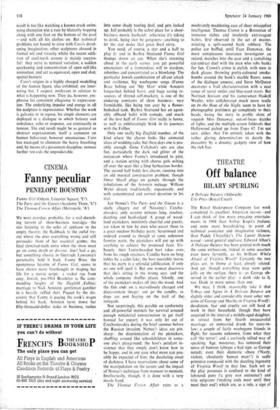Funny Girl (Odeon. Leicester Square, `U')
CINEMA
Fanny peculiar
PENELOPE HOUSTON
The Party and the Guests (Academy Three, `U') The Thomas Crown Affair (Metropole, 'A') We were overdue, probably, for a real drench- ing torrent of show-business nostalgia—the star listening to the echo of applause in the empty theatre; the flashback to the awful try- out where she does everything wrong and still persuades them of her essential genius; the final clenched-teeth entry when the show must go on come death or divorce. Star! had a go, but something elusive in Gertrude Lawrence's personality held it back. Fanny Brice, the eponymous heroine of Funny Girl, seems to have shown more forethought in shaping her life for a movie script: a rocket rise from cosy, Jewish, pre-1914 Brooklyn to 'Me com- manding heights of the Ziegfeld ,Follies; marriage to Nick Arnstein, gentleman gambler in a heavily ruffled shirt. Piqued by the dis- covery that Fanny is paying the cook's wages behind his back, Arnstein turns down her fifty-thousand-dollar stake in business, rushes into some shady touting deal, and gets locked up. Jail probably is the safest place for a show- business movie husband : otherwise it's taking to drink, being shot by gangsters—anything to let the star make that great final entry.
You need, of course, a star and a half to play it; and in Barbra Streisand Funny Girl thumps down an ace. When she's storming about in the early scenes, you get powerful emanations of a tremendous will to stardom, relentless and concentrated as a blowlamp. The particular Jewish combination of all-out attack and resilience, big woebegone songs (Fanny Brice belting out 'My Man' while Arnstein languished behind bars), and huge saving re- sources of shrewd self-mockery, is one of the enduring constants of show business: very formidable, like being run over by a flower- bedecked tank. Barbra Streisand has an agree- ably offhand habit with comedy, and much of the first half of Funny Girl really is funny, as well as exhilaratingly brisk in its journeys with the Follies.
Only one really big Ziegfeld number, of the kind where the chorus looks like animated slices of wedding cake, but these days one is pos- sibly enough. Gene Callahan's sets are also fun, particularly the dark red glitter of the restaurant where Fanny's introduced to pâté, and a station setting with chorus girls wilting all over the seats like a limp herbacious border. The second half holds less charm, running into an old musical construction problem. though Omar Sharif plugs on gamely through the tribulations of the Arnstein ménage. William Wyler directs traditionally, expansively. and with concentrated and correct devotion to his star.
Jan Nemec's The Party and the Guests is a steely allegory out of Novotny's Czecho- slovakia: only seventy minutes long. resolute, dazzling and hard-edged. A group of wood- land picnickers, indolently cheerful and greedy. are taken in tow by.men who escort them to a great outdoor birthday party. Scrutinised and ordered around as though at some unknown frontier party, the picnickers will put up with anything to achieve the promised feast. Ur- banely. their Lenin-bearded host takes over;; from his rough retainers. Candles burn on long tables by a calm lake; the host peevishly insists that his party is a splendid jollification, if only no one will spoil it. But one woman discovers that she's sitting in the wrong seat, and the whole company shuffles places. Silently, one ' of the picnickers makes off into the wood. And the film ends on a marvellously charged and dispassionate image: out go the candles, as dogs are sent baying on the trail of they, renegade.
Not surprisingly, this parable on conformity and all-powerful instincts for survival aroused enough ministerial consternation to get itself banned for export; it was only let out of Czechoslovakia during the brief summer before the Russian invasion. Nemec's ideas are pin- sharp: the disorientation of the picnickers, shuffling around like schoolchildren in some- one else's playground; the host's petulant in- sistence that they simply don't know how to be happy, and in any case what more can pos- sibly be expected of him; the desolating onset of darkness. I have reservations about some of the manipulation on the screen and the impact of Nemec's technique from moment to moment. Intellectually, though, it is done with a very steady hand.
The Thomas Crown Affair rates as a moderately maddening case of sheer misapplied intelligence. Thomas Crown is a Bostonian of immense riches and insolently extravagant habits, first observed in the act of master- minding a split-second bank robbery. The police are baffled, until Faye Dunaway, the most conspicuous insurance investigator on record, marches into the case and a tantalising cat-and-cat duel with the man who robs banks for fun. Crown's crime is stylish, with men in dark glasses throwing pretty-coloured smoke- bombs around the bank's marble floors; some of the dialogue amuses; and Steve McQueen decorates a frail characterisation with a neat range of secret smiles and blue-eyed stares. But Norman Jewison and his cameraman Haskell Wexler, who collaborated much more tautly on In the Heat of the Night, seem to have let photographic prettiness go completely to their heads, losing the story in profile shots of voguish Miss Dunaway. out-of-focus dazzles of lights, and the multiple-screen folderols that Hollywood picked up from Expo 67. I'm not sure. either, that I'm entirely taken with the rather glaring determination to dazzle the peasantry by a dreamy. gadgety view of how the rich live.


































 Previous page
Previous page